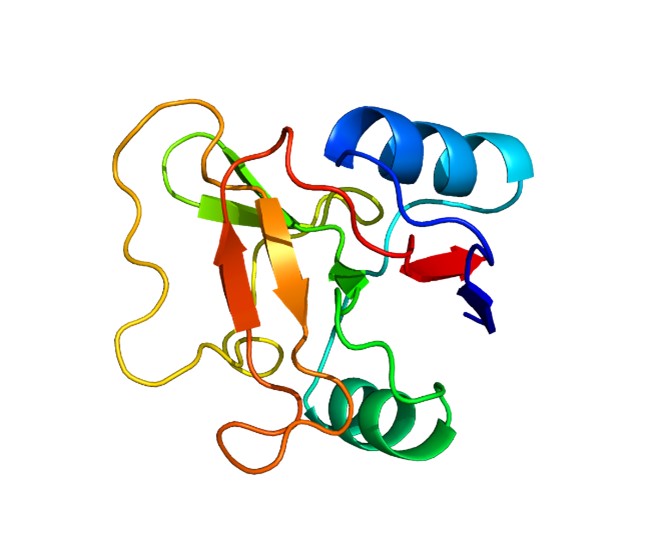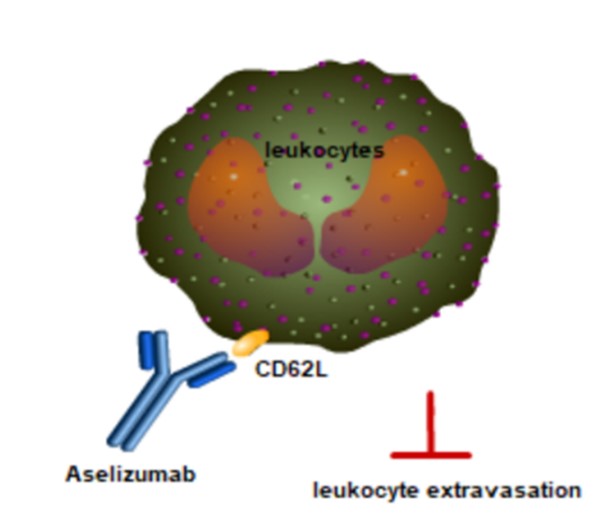Aselizumab Overview
Introduction of Aselizumab
Aselizumab is an engineered antibody designed to specifically target and bind to SELL which is also known as CD62L or L-selectin. SELL is a cell adhesion molecule present on the surface of leukocytes (white blood cells) and the blastocyst. It is coded by the SELL gene in humans. L-selectin plays a crucial role in the immune system, particularly in both the innate and adaptive immune responses. It facilitates the adhesion of leukocytes to endothelial cells, a critical event that allows these immune cells to migrate out of the circulatory system and reach sites of inflammation or tissue injury. This process, known as leukocyte rolling and adhesion, is the first step in leukocyte extravasation, where white blood cells leave the bloodstream and enter affected tissues to combat infection or repair damage. By binding to CD62L and inhibiting its function, aselizumab effectively prevent the initial steps of leukocyte rolling and adhesion. This reduction in leukocyte migration to inflammatory sites can potentially lessen the inflammatory response associated with various disease conditions. This targeted approach offers a novel strategy for managing diseases characterized by excessive inflammation, such as autoimmune disorders, chronic inflammatory diseases, and certain types of tissue damage.
Biological and Chemical Properties of Aselizumab
Protein Structure
 Figure 1. Structure of Human SELL/CD62L/L-selectin (Wikipedia).1
Figure 1. Structure of Human SELL/CD62L/L-selectin (Wikipedia).1
Protein Average Weight
The average weight of the protein is approximately 42.90 kDa.
Mechanism of Action of Aselizumab
Aselizumab is an immunosuppressive recombinant antibody designed to target and bind SELL/CD62L. SELL/CD62L is a type I transmembrane protein belonging to the selectin family, which mediates the initial tethering and rolling of leukocytes on the vascular endothelium under shear flow conditions found in the bloodstream. CD62L is involved in the homing of leukocytes to lymphoid tissues and the recruitment of leukocytes to sites of inflammation. It plays a crucial role in leukocyte extravasation, capturing and rolling leukocytes on endothelial cells during the immune response. In some inflammatory diseases, such as asthma and rheumatoid arthritis, the enhanced expression and increased activity of CD62L on eosinophils and other leukocytes can exacerbate inflammatory responses, deteriorating the immune system. Therefore, blocking CD62L has been introduced to reduce inflammation in preclinical models and has shown promising results.
 Figure 2. Mechanism of Action of Aselizumab (Creative Biolabs Original)
Figure 2. Mechanism of Action of Aselizumab (Creative Biolabs Original)
Target Recognition and Binding
Aselizumab binds specifically to CD62L on the surface of leukocytes with high affinity due to its engineered specificity. By binding to CD62L, the antibody blocks the interaction between CD62L and its ligands (such as GlyCAM-1, MadCAM-1). This effectively prevents leukocytes from adhering to the endothelium and entering tissues, potentially ameliorating inflammatory responses in various disease conditions.
Inhibition of Leukocyte Extravasation
By binding to CD62L, aselizumab interferes with the interaction between CD62L and its ligands (such as GlyCAM-1, MadCAM-1) expressed on endothelial cells, blocking the subsequent adhesion of leukocytes to the vascular endothelium. This interference prevents leukocytes from rolling along the blood vessel walls and extravasating into tissues, ultimately inhibiting leukocyte extravasation.
Potential Modulation of Immune Response
Anti-SELL/CD62L recombinant antibodies impede the process of leukocyte extravasation, significantly diminishing immune cell accumulation and infiltration at inflammatory sites. Leukocyte extravasation is the crucial process by which white blood cells leave the circulation system and travel to regions of tissue injury or infection. By blocking this route, these antibodies minimize unnecessary immune cell accumulation in specific tissues, reducing inflammatory processes and tissue damage. This therapeutic approach can treat various inflammatory disorders by reducing the presence of pro-inflammatory cells and lowering the production of inflammatory mediators. This therapeutic approach aims to provide better outcomes for conditions characterized by excessive or chronic inflammation, such as autoimmune diseases, chronic inflammatory disorders, and potentially even acute inflammatory responses following injuries or infections.
Therapeutic Implications
These antibodies could be employed to treat a variety of inflammatory and autoimmune conditions characterized by an overactive immune response driven by excessive leukocyte migration. Conditions like rheumatoid arthritis, inflammatory bowel disease, and multiple sclerosis often involve such pathological mechanisms, making the inhibition of leukocyte extravasation a valuable strategy. By targeting and neutralizing CD62L activity, the antibodies can prevent the excessive accumulation of immune cells at inflammation sites, mitigating associated tissue damage and inflammatory responses. Additionally, these antibodies may reduce graft rejection incidents in organ transplantation by curtailing the infiltration of donor-reactive leukocytes, enhancing transplant success rates and promoting long-term graft acceptance. Their therapeutic potential spans a diverse spectrum of medical conditions rooted in dysregulated immune cell migration and activity.
Clinical Projects of Aselizumab*
| NCT ID | Study Title | Study Status | Conditions | Sponsor | Start Date |
| unknown | The Effect of Anti-L-Selectin (Aselizumab) in Multiple Traumatized Patients | COMPLETED |
multiple trauma Aselizumab |
Scil Biomedicals GmbH | unknown |
* The table was excerpted from the following essay: Seekamp A, et al. The effect of anti-L-selectin (Aselizumab) in multiple traumatized patients--results of a phase II clinical trial. Crit Care Med. 2004;32(10):2021-2028.
- Wikipedia (https://en.wikipedia.org/wiki/L-selectin).
For research use only. Not intended for any clinical use.
This site is protected by reCAPTCHA and the Google Privacy Policy and Terms of Service apply.



